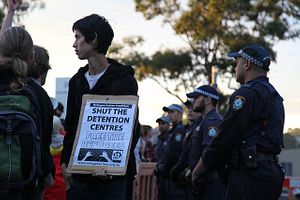After being held on board an Australian customs vessel at sea for almost a month, the first of the 157 Sri Lankan asylum seekers who departed from India will be transferred to the Australian mainland.
The asylum seekers, mostly believed to be ethnic Tamils, have breached the Australian government’s border policy and will be the first asylum seekers to reach the Australian mainland in seven months.
With the boat originating from southern India, Delhi has now been drawn into the fray over the refugee’s fate.
Some of the 157 have already arrived at the Curtin Immigration Detention Center in the remote desert of Western Australia, and Indian consular officials have been sent to interview them.
India has so far only agreed to consider those of Indian nationality among the refugees, but has hinted it is possible it may take more.
The Tamils are believed to have come from refugee camps in the southern Indian state of Tamil Nadu, with the possibility that some of the children on board may have been born in India.
This comes after visits to Delhi last week by Australian Immigration Minister Scott Morrison and Lieutenant-General Angus Campbell, who is in charge of Australia’s military operation to stop asylum seeker boats, entitled “Operation Sovereign Borders.”
Australia argued that as the boat was flying an Indian flag and originated from India, the Australian government, which intercepted the boat in international waters, had a right to return it to its point of origin.
India’s Home Minister Rajnath Singh and External Affairs Minister Sushma Swaraj, who met with the Australian delegation, seemed to rebuff the request.
It isn’t clear what negotiations are taking place with India to secure the transfer of potentially all of the 157 asylum seekers, and Morrison has dismissed the notion that Delhi is asking for something in return for cooperation.
However it is difficult to understand why the Indian government would assist the Australian government in saving face and expect nothing in return.
This is even more likely since India is now under the leadership of Prime Minister Narandra Modi, who has positioned himself as a tough leader and promised to take a more assertive role in the region. It is hard to see Modi bending to Canberra’s will without some kind of give and take, either now or later on.
What kind of give and take, or whether this issue will just form a part of a growing bilateral relationship, isn’t yet clear. In fact, Indo-Australian relations are at a historic high, particularly over the last year as the two countries negotiate a comprehensive nuclear deal for Australia to sell uranium to India.
Australia had previously refused to sell uranium to India as it is not a signatory to the Nuclear Non-Proliferation Treaty (NPT).
Since the change of government last year, Australia’s asylum seeker policy has been to forcibly turn back boats, which usually come from Indonesia.
Last month Australia faced condemnation from international human rights groups and the U.N. after it handed over 41 intercepted asylum seekers to the Sri Lankan Navy. The 41 are now facing court and potential prison sentences in Sri Lanka for leaving the country illegally.

































